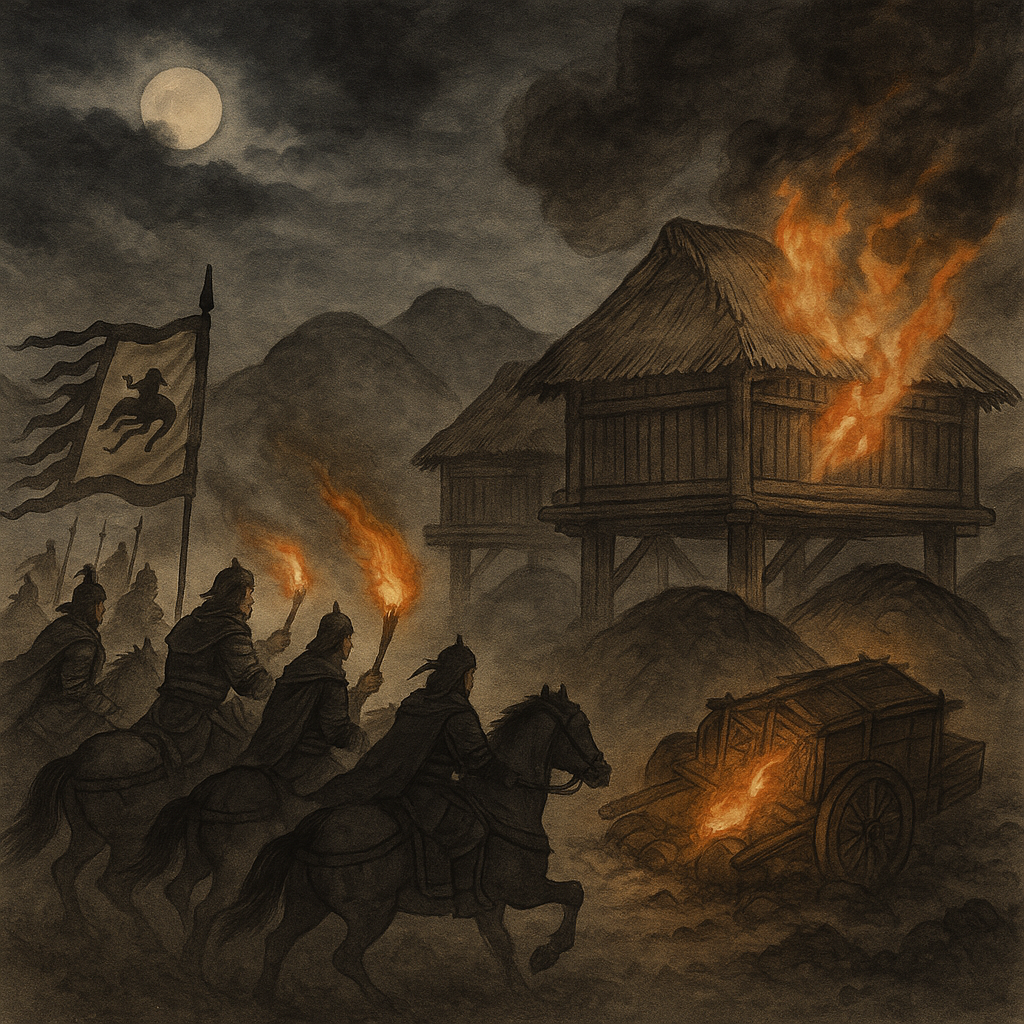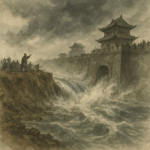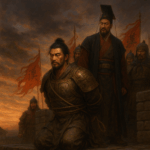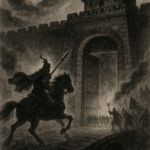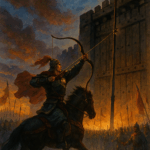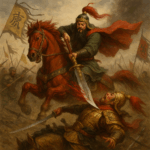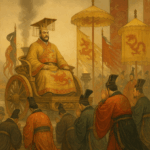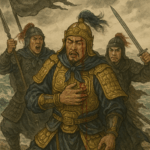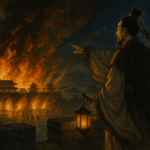When Yuan Shao mobilized his forces and prepared to advance on Guandu, Xiahou Dun sent an urgent letter to Cao Cao. In response, Cao Cao mustered seventy thousand troops and marched to meet the enemy in person, leaving Xun Yu to hold Xuchang. Before departure, Tian Feng—then imprisoned for earlier disagreements—submitted a memorial urging cautious defense and warning against a rash, large-scale offensive. But Feng’s words were slandered by Feng Ji, who accused him of spreading ill omens. Yuan Shao, enraged, threatened to execute Tian Feng, though his advisers intervened to spare him—an offense Shao vowed to avenge once Cao Cao was defeated.
As Shao’s vast host assembled, Ju Shou counseled restraint: though Yuan Shao’s army outnumbered Cao’s, his own supplies were ample, whereas Cao’s were limited; if they held their ground and waited, Cao’s forces would collapse of their own accord. Shao flew into a rage at this suggestion—imprisoning Ju Shou—and swore to punish both him and Tian Feng together after victory. Then, his banners stretching across ninety li, Yuan Shao encamped around Guandu like a starless sea.
Scouts sent to probe Cao Cao’s position reported back to Guandu, sowing fear among the newly arrived Wei troops. Cao Cao convened his chief strategists. Xun You advised that Shao’s numerical superiority posed little threat: Cao’s men were veterans, each worth ten common soldiers, yet time was their foe—protracted engagement would drain their meager stores. Cao agreed. He ordered drums sounded and trumpets blown, and charged forward. Yuan Shao advanced to meet him, arrayed in golden helmets, gilded armor, and silk robes, his flatterers in attendance. Hidden crossbowmen under Shen Pei lay in ambush on both flanks, and expert archers crouched behind the camp banners, ready to unleash a withering volley at the signal.
When the battle began, Cao Cao rode out beneath his personal banner, flanked by Xu Chu, Zhang Liao, Xu Huang, and Li Dian. He whipped his horse toward Yuan Shao and shouted, “In the Emperor’s name I proclaimed you Grand General—why now do you rebel?” Shao retorted, “You wield the chancellor’s title yet act like a tyrant! Your crimes exceed even Dong Zhuo’s. You call me rebel for defending the realm?” Cao cried, “I come by imperial edict to punish traitors!” and their armies clashed.
After fierce fighting, Yuan Shao’s vanguard under Zhang He, Gao Lan, and Han Meng forced Cao’s lines to fall back. Shen Pei sounded the ambush signal; ten thousand crossbow bolts rained upon the Wei center, and for a time the imperial banners wavered. But Cao Cao ordered Xiahou Dun and Cao Hong—each with three thousand men—to charge the enemy flank. Shen Pei’s ambush collapsed, and Yuan Shao’s troops retreated in panic to the safety of Guandu.
Yuan Shao then erected fifty earthen mounds in front of Cao’s camp, each topped with a wooden lookout tower manned by soldiers who rained arrows onto the Wei lines. For ten days Cao’s men endured constant bombardment, huddled behind their shields. Meanwhile Cao Cao turned again to his advisers: Liu Ye proposed siege engines to break the towers. That night hundreds of traction trebuchets were built within the camp walls, aimed at the enemy mounds. On the next demonstration, as Yuan Shao’s archers loosed their volleys, Cao’s troops released the trebuchets; stones and metal shot struck the towers with thunderous force, sending bolts and archers plummeting. The new machines became known as “Thunderclap Wagons,” and from that day Yuan Shao’s men no longer dared perch atop the mounds.
Next Shen Pei suggested digging tunnels beneath Cao’s ramparts to infiltrate the camp under cover of darkness. Xun You counseled Cao Cao to excavate a trench encircling his own defenses; when Shen Pei’s men broke into the trench, they found only empty earth. Exhausted and shamed, Yuan Shao’s sappers gave up their plan.
By autumn’s end, Cao Cao’s food stores were nearly spent, and he wavered on retreating to Xuchang. He wrote secretly to Xun Yu, who replied:
“Yuan Shao gathers his host at Guandu to decide the realm’s fate. Though he outnumbers you, his commanders are incompetent; by holding a strong position and parrying his assaults, you will exhaust him. Heaven’s mandate is yours to seize—stand firm, and victory will follow.”
Buoyed, Cao Cao ordered his men to hold at all costs. Yuan Shao’s army advanced again, tightening the siege. One night, Xu Huang’s subordinate Shi Huan seized a Yuan Shao spy who revealed that Han Meng would soon escort supply wagons to the front lines. Xun You urged Cao Cao to dispatch a light force to intercept and destroy the grain convoy. Cao Cao selected Xu Huang and launched a midnight raid. They fell upon Han Meng’s troops, slaughtered the guards, and set fire to the thousand grain carts. With Yuan Shao’s stores at Wuchao in flames, his army’s backbone snapped.
In desperation, Yuan Shao ordered Chunyu Qiong and other generals to hold the charred remains of Wuchao. Meanwhile, Cao Cao feigned a night assault on Guandu itself. Under cover of darkness and flying Yuan Shao’s banners, five thousand cavalry slipped past the outposts and fell on Wuchao. Drunken and unprepared, Chunyu Qiong’s men were overwhelmed; Qiong himself was captured, mutilated, and paraded back to demoralize the enemy.
Back at Guandu, Yuan Shao could only watch the northern horizon burst into flame. Counselors disagreed: some urged direct rescue of Wuchao, others advised striking at Cao’s camp. Yuan Shao divided his forces, but his maneuvers faltered. Zhang He and Gao Lan disguised themselves as retreating Wuchao survivors and defected to Cao Cao, who welcomed them with honors. When Cao launched a three-pronged raid on Yuan Shao’s weakened camps, the foe’s will collapsed and a great rout ensued. Yuan Shao fled on horseback with only eight hundred retainers, abandoning his treasure and wagons. Eighty thousand of his men fell in the slaughter or drowned in the Yellow River.
In Guandu’s smoking ruins, Cao Cao rewarded his officers and, finding letters of conspiracy among Yuan Shao’s allies, chose mercy rather than vengeance—burning the documents. One loyal adviser, Ju Shou, had been executed by Yuan Shao for his prudent counsel. Cao Cao, chagrined, gave Ju Shou an honorable funeral by the Yellow River, erecting a tomb inscribed “Tomb of Lord Ju, Faithful and Brave.”
With Yuan Shao crushed and his forces demoralized, Cao Cao prepared to press northward into Ji Province. As the dust settled, he reflected:
“The weak fall by too many schemes;
The strong perish for lack of them.”
The struggle for China’s heartland raged on—what new fate awaited the realm? The answer lies ahead.
